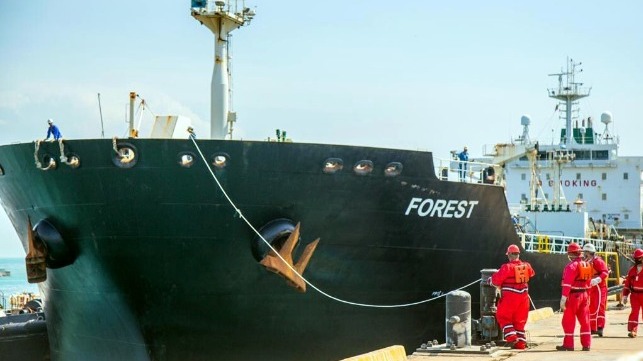Report: Three More Iranian Tankers Under Way With Fuel for Venezuela

Analysts with TankerTrackers.com have tentatively identified a new round of Iranian gasoline shipments to Venezuela. According to the firm, the product tankers Forest, Faxon and Fortune appear to have taken on about 825,000 barrels of gasoline at Port Shahid Rajaee, then turned off their AIS transponders. None have broadcast an AIS position since the end of August, according to consultancy Dryad Global.
TankerTrackers.com believes that these vessels are "very likely" headed for Suez, then Venezuela - marking the second time this year that Iranian-flagged vessels have carried gasoline cargoes on this route.
Venezuela is in the midst of a dire fuel shortage, driven in part by U.S. sanctions on its petroleum industry and in part by a long decline in the maintenance of its refineries. Earlier this year, its government reached an agreement with Iran for the delivery of five tanker loads (about 1.5 million barrels) of gasoline. The Forest, Faxon and Fortune were part of that shipment, along with the Petunia and Clavel, all Iranian-flagged. Like Venezuela, Iran is also under strict U.S. sanctions, and the United States added the masters of all five ships to its travel and banking blacklist for their involvement in the transaction.

that matters most
Get the latest maritime news delivered to your inbox daily.
In July, a second shipment of 1.1 million barrels of Iranian-sourced gasoline aboard foreign-flagged, Greek-operated ships was seized by the United States government. The vessels' operators voluntarily agreed to transfer the fuel to tankers chartered by the United States; the mariners, vessels and shipowners involved were not sanctioned, but the fuel's buyers are under investigation for allegedly "providing material support or resources to a designated foreign terrorist organization." The U.S. considers the Iranian government's Islamic Revolutionary Guard Corps (IRGC) to be a terrorist organization, and the IRGC has extensive interests in Iran's oil and gas industry.
"It is likely that Iran has learnt from this previous experience that foreign-owned vessels will be more willing to comply with U.S. restrictions and requests, and in turn Iran has sought to bring the vessels it uses ‘in house’. All three vessels which are currently of interest are Iranian managed and owned," wrote Dryad Global in an assessment. "It remains a credible possibility that if the tankers do intend to transit to Venezuela, that the U.S. will seek to again intervene. However, Iran has raised the stakes and has utilized vessels which will likely not be willing to give up their cargoes or comply willingly with the U.S."
